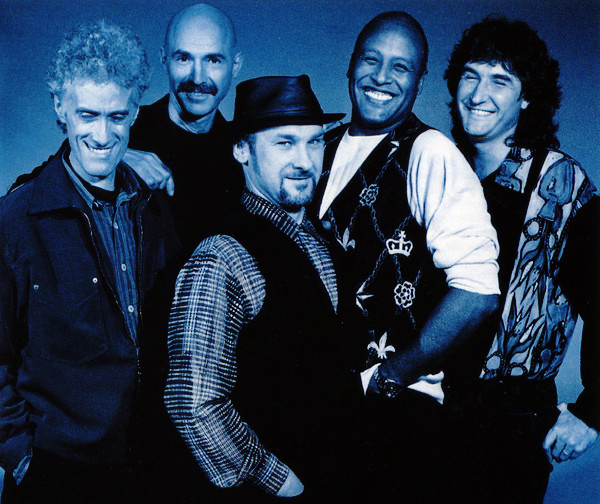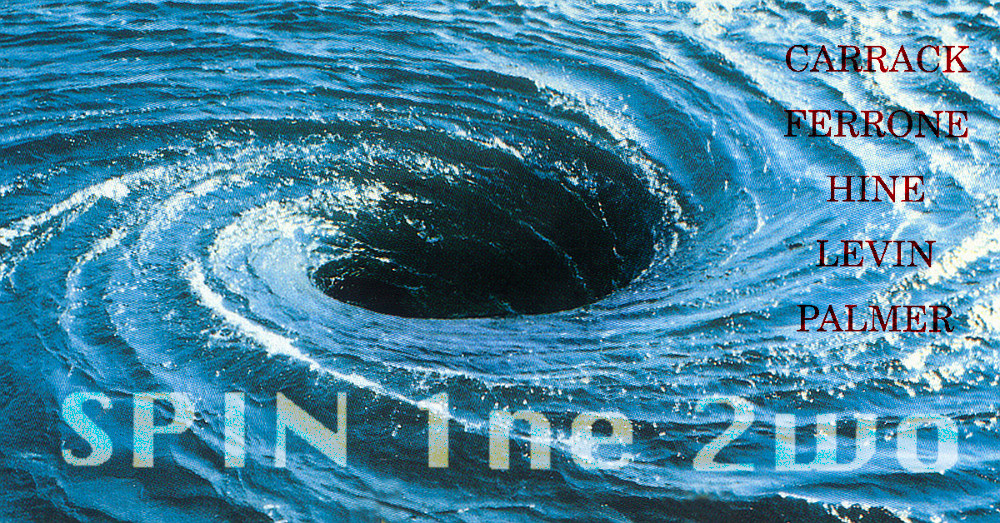- Article
- Read in 6 minutes
Spin 1ne 2wo (feat. Paul Carrack & Tony Levin) – album review
Tony Levin and Paul Carrack were both part of an interesting band project in the mid-nineties, calles Spin 1ne 2wo. Harald Köhncke looks back.
According to wikipedia, the project Spin 1ne 2wo was set up by guitarist Phil Palmer. Genesis fans may take an interest mainly because of the who was in the band: Bass and stick player Tony Levin from Peter Gabriel’s band and Paul Carrack, singer with Mike + The Mechanics. The project’s keyboarder (and producer) Rupert Hine also produced some of Anthony Phillips’s early records.
The line-up is completed by drummer Steve Ferrone. He also joined Tom Petty And The Heartbreakers at that time and left his mark on many albums as a session drummer. Stephen W. Tayler mixed the album and solved all technical issues, as he had done before for everyone involved.
What did these musicians bring together? In an interview with the World Of Genesis website Tony Levin said it had been the idea of an Italian record company executive.
The CD booklet attempts to give the project a touch of science. It explains the fractal shown on the inside covers (and provides the formula!) and offers a brief text by Stephen Hawking in which he explains the spin quantum number. We find out that the project name Spin 1ne 2wo is to be read as “spin 1/2″ and also learn that it takes elementary particles with this spin quantum number two revolutions to return to their original state. What this might have to do with the music on this CD is anybody’s guess.

The self-titled debut of Spin 1ne 2wo is an album of cover versions only. Eleven famous and legendary rock songs from the 1960s and the 1970s were chosen for it (twelve songs for the CD).
These are, in order of their original releases: Reason To Believe by Tim Hardin (1966), which is also known in a Rod Stewart version from 1971; You Keep Me Hanging On by Holland/Dozier/Holland, first released by The Supremes (1966) and many other artists after that, one of which is Phil Collins on his Roseland Ballroom DVD & Blue-ray of the Going Back album (2010); All Along The Watchtower by Bob Dylan (1968), also known from Jimi Hendrix (1968, too); White Room by Cream (1968); On The Road Again by Canned Heat (1968); Can’t Find My Way Home by Blind Faith (1969); Angel by Jimi Hendrix (1971); Black Dog by Led Zeppelin (1971); Reelin’ In The Years by Steely Dan (1973); Feel Like Makin’ Love by Bad Company (1975); Kashmir by Led Zeppelin (1975) and Who Are You by The Who (1978).
Incidentally, the Tony Levin Band also released Black Dog on their live album Double Espresso(2002).
For some reason, the booklet confuses You Keep Me Hanging On with a country song that has the same title and erroneously credits the writers of that song, Ira Allen and Buddy Mize
Now, what does it sound like when a bunch of such outstanding musicians tackle these songs? I am tempted to say: Just like would it expect it to.
The obvious approach is to compare the recording with the originals. All Along The Watchtoweris somewhere in between Dylan’s and Jimi Hendrix’s album. There is an acoustic guitar, but also searing riffs on the electric guitar and a solo that, naturally, cannot compare with Hendrix’s playing. The organ fits well in the background. The song is played a bit faster than the original, and the crisp, varied drumming stand out; in the original versions the drums sounded a bit musty because of the age of the recordings. A fine update of the song.
Paul Carrack’s vocals show to their advantage in Can’t Find My Way Home; calm songs with a dash of blues and soul are right down his avenue. Keyboards rule this version; like an orchestra they shape the background before which acoustic guitars (strumming chords instead of picking notes) and organ play up. You also notice a funky guitar or perhaps Tony Levin’s stick. Speaking of whom, his bass can be heard, of course, but it never moves to the foreground but carries on the rhythm in a relaxed, warm groove. Can’t Find My Way Home preserves the atmosphere of the original even though the Spin 1ne 2wo version is less acoustic and less hippiesque.
Angel gets the kitsch treatment on this CD, for Hendrix’s darker voice and the slightly threatening bass of the original are replaced with instruments that are typical for a love song (which fits the lyrics, of course).
If you did not know the original version, you would listen to White Room and instantly say: Cool song! It makes much use of the keyboards, and Levin’s bass (a bit louder in the mix here) has a very modern sound (as on Peter Gabriel’s So) so that the bluesy psychedelic mood of the original does not really unfold.

Reason To Believe is originally a lovely folk song, a bit sugary but quite typical for the period. The cover version turns this into a love song focusing on Paul Carrack’s voice but without any folk sounds. It looks more to Rod Stewart’s version in that respect, but Stewart’s is still a completely different version with his rough voice, acoustic bass, violin etc. What Spin 1ne 2wo have recorded here could easily be included in one of Carrack’s solo records.
You Keep Me Hanging On is slowed down from a danceable soul song to a sedately grooving rock song (in fact, Phil Collins’s version is much closer to the original). The instruments are much the same as on the previous songs, but the bass sounds very warm and much stronger. There are also violins in the background and the noticeable sprinkles of an organ.
Black Dog and Kashmir are exceptional here for the versions recorded here are shorter than the originals. They use almost the same instruments as in the original recordings. Though the drumming here is outstanding, the drums lack power in the mix. Black Dog is played as an instrumental. As expected, Paul Carrack’s voice does not come across as strong as Robert Plant’s. Tony Levin gets the opportunity to play around on the stick towards the end of Black Dog and turn up the funky bass in Kashmir.
A strong bass can also be heard On The Road Again. The brooding highway atmosphere of the original is replace with a grooving monotony, with occasional organ spots towards the end. That fits the song very well, though it differs much from the original.
With Feel Like Makin’ Love I think that Paul Carrack’s gentle voice does not fit into the largely original arrangement of the songs. Massive keyboard sounds support his voice and the guitar riffs have been attenuated, this is and remains a hard rock song. A mouth organ solo (or is it keyboard?) towards the end is a new element that pushed the hard rock towards the blues at the end of the song.
Reeling In The Years was first released on Steely Dan’s debut album. In this new recording it loses all of its 70s vibe and becomes a rather run-of-the-mill pop song. The piano has been replaced with acoustic guitars. Phil Palmer’s guitar solo falls well short of the 1973 solos.

The most modern sounding original version of the songs assembled here is probably Who Are You. The Who added synthesizers to their typical sound. Spin 1ne 2wo replace them with keyboards in the intro and fade them out during the song. We get some organ and some of Tony Levin’s stick in the foreground. This also sort of replaced the acoustic guitar solo in the middle of the original version. The choir-like vocals by The Who in the bridge are replaced with a spot of piano.
The band play on an extremely high level of musicality. There have been few changes in the songs; you can recognize each of them straight away. The recordings have a modern production (by 1993’s standards) and sound like similar songs from the late 80s and early 90s).
Who is supposed to buy this album? Fans of the originals will miss the flavour of the 1960s or the 1970s. The arrangements aren’t groundbreaking either. If I had to choose I’d recommend listening to the original songs. The album may be worthwhile for fans of Paul Carrack’s voice.
Two singles were released from this LP in 1993. Neither Can’t Find My Way Home nor All Along The Watchtower met with much success, though.
After that, Spin 1ne 2wo fell into oblivion again, and I dare say nobody minded. However, Phil Palmer said in a 2013 interview that seeing that the album had a circle of huge fans they were considering recording a second album!
Nothing has happened so far, but who knows…
Author: Harald Köhncke (April 2019)
English by Martin Klinkhardt
Spin 1ne 2wo is currently out of print. You may check third party offers on amazonUK, though

